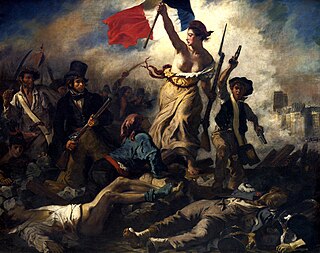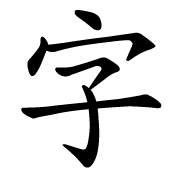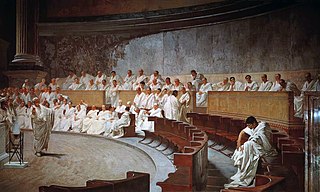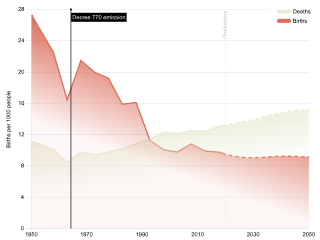Related Research Articles

Romantic nationalism is the form of nationalism in which the state derives its political legitimacy as an organic consequence of the unity of those it governs. This includes such factors as language, race, ethnicity, culture, religion, and customs of the nation in its primal sense of those who were born within its culture. It can be applied to ethnic nationalism as well as civic nationalism. Romantic nationalism arose in reaction to dynastic or imperial hegemony, which assessed the legitimacy of the state from the top down, emanating from a monarch or other authority, which justified its existence. Such downward-radiating power might ultimately derive from a god or gods (see the divine right of kings and the Mandate of Heaven).

A courtesy name, also known as a style name, is a name bestowed upon one at adulthood in addition to one's given name. This practice is a tradition in the East Asian cultural sphere, including China, Japan, Korea, and Vietnam.
In science and philosophy, a paradigm is a distinct set of concepts or thought patterns, including theories, research methods, postulates, and standards for what constitute legitimate contributions to a field.
Liberalization or Liberalisation is a broad term that refers to the practice of making laws, systems, or opinions less severe, usually in the sense of eliminating certain government regulations or restrictions. The term is used most often in relation to economics, where it refers to economic liberalization, the removal or reduction of restrictions placed upon economic activity. However, liberalization can also be used as a synonym for decriminalization or legalization, for example when describing drug liberalization.

Industrialisation is the period of social and economic change that transforms a human group from an agrarian society into an industrial society. This involves an extensive re-organisation of an economy for the purpose of manufacturing. Historically industrialization is associated with increase of polluting industries heavily dependent on fossil fuels. With the increasing focus on sustainable development and green industrial policy practices, industrialization increasingly includes technological leapfrogging, with direct investment in more advanced, cleaner technologies.
An extended family is a family that extends beyond the nuclear family, consisting of parents like father, mother, and their children, aunts, uncles, grandparents, and cousins, all living in the same household. Particular forms include the stem and joint families.
Since both the Chinese Communist Party (CCP) and the People's Liberation Army (PLA) promote according to seniority, it is possible to discern distinct generations of Chinese leadership. In official discourse, each group of leadership is identified with a distinct extension of the ideology of the CCP. Historians have studied various periods in the development of the government of the People's Republic of China by reference to these "generations".
A parasite single is a single person who lives with their parents beyond their late 20s or early 30s to enjoy a more carefree and comfortable life. In Japanese culture, the term is especially used when negatively describing young unmarried women.

Most generally, in the lineal kinship system used in the English-speaking world, a cousin is a type of familial relationship in which two relatives are two or more familial generations away from their most recent common ancestor. Commonly, "cousin" refers to a first cousin – a relative of the same generation whose most recent common ancestor with the subject is a grandparent.

Mikhail Aleksandrovich "Michael" Chekhov was a Russian-American actor, director, author and theatre practitioner. He was a nephew of the playwright Anton Chekhov and a student of Konstantin Stanislavski. Stanislavski referred to him as his most brilliant student.

Marxism is a left-wing to far-left method of socioeconomic analysis that uses a materialist interpretation of historical development, better known as historical materialism, to understand class relations and social conflict as well as a dialectical perspective to view social transformation. It originates from the works of 19th-century German philosophers Karl Marx and Friedrich Engels. As Marxism has developed over time into various branches and schools of thought, currently no single, definitive Marxist theory exists.

Auctoritas is a Latin word which is the origin of English "authority". While historically its use in English was restricted to discussions of the political history of Rome, the beginning of phenomenological philosophy in the 20th century expanded the use of the word.
The little emperor syndrome is an aspect/view of Mainland China's one-child policy where children of the modern upper class and wealthier Chinese families gain seemingly excessive amounts of attention from their parents and grandparents. Combined with increased spending power due to China's growing economic strength within the family unit and parents' general desire for their child to experience the benefits they themselves were denied, the phenomenon is generally considered to be controversial. The British journalist Andrew Marshall even argues that it is shaping modern Chinese society in unexpected ways that may culminate into a future "behavioral time-bomb".

Cradle-to-cradle design is a biomimetic approach to the design of products and systems that models human industry on nature's processes, where materials are viewed as nutrients circulating in healthy, safe metabolisms. The term itself is a play on the popular corporate phrase "cradle to grave", implying that the C2C model is sustainable and considerate of life and future generations—from the birth, or "cradle", of one generation to the next generation, versus from birth to death, or "grave", within the same generation.

Intergenerational equity in economic, psychological, and sociological contexts, is the idea of fairness or justice between generations. The concept can be applied to fairness in dynamics between children, youth, adults, and seniors. It can also be applied to fairness between generations currently living and future generations.
Empower Playgrounds, Inc. is a U.S.-based 501(c)(3) public charity that has developed electricity-generating playground equipment for use in rural third-world communities with low rates of rural electrification. The charity works in predominantly subsistence agriculture communities, where children often work on family farms until sundown, and schools and homes are not equipped with electricity, making it difficult for children to do homework or develop study habits.
The Post-'80s is a Chinese colloquial term referring to the generation in Mainland China born between 1980 and 1989, especially in urban cities, after the introduction of the one-child policy. It is the Chinese counterpart to the early Generation Y in the Western World, the first post-Cultural Revolution generation, and the first to grow up entirely within the Reform era. The Post-80s currently ranges from age 32 to 42, making up a major portion of China's working young adult demographic.

Decree 770 was a decree of the communist Romanian government of Nicolae Ceaușescu, signed in 1967. It restricted abortion and contraception, and was intended to create a new and large Romanian population. The term decreței is used to refer to those Romanians born during the time period immediately following the decree.

De Leonism is a libertarian Marxist current developed by the American activist Daniel De Leon. De Leon was an early leader of the first American socialist political party, the Socialist Labor Party of America (SLP). De Leon introduced the concept of Socialist Industrial Unionism.

The socialist mode of production, sometimes referred to as the communist mode of production, or simply (Marxian) socialism or communism as Karl Marx and Friedrich Engels used the terms communism and socialism interchangeably, is a specific historical phase of economic development and its corresponding set of social relations that emerge from capitalism in the schema of historical materialism within Marxist theory. The Marxist definition of socialism is that of production for use-value, therefore the law of value no longer directs economic activity. Marxist production for use is coordinated through conscious economic planning. According to Marx, distribution of products is based on the principle of "to each according to his needs", however soviet models have often distributed products based on the principle of "to each according to his contribution". The social relations of socialism are characterized by the proletariat effectively controlling the means of production, either through cooperative enterprises or by public ownership or private artisanal tools and self-management. Surplus value goes to the working class and hence society as a whole.
References
- ↑ Kozal, J. (1978). Children of the Revolution. Delacorte Press.